Best Low Spread Brokers - Top 5 Online Low Spread Brokers in 2021 - EconomyWatch.com
When trying to find a broker, many people are concerned with the spread cost and how much money they will actually be spending. Low spread brokers are worth looking at so you can know when the asking price and bid price are close together. Check this guide giving you all the information you need to know to get started with low spread brokers.
Table of Contents
Top 5 Low Spread Brokers in 2021 – A Quick Overview
- eToro, USA's Best Low Spread Broker for Beginners.
- Avatrade, USA's Most Popular Low Spread Broker.
- Capital.com, USA's Newest Low Spread Broker.
- Fineco Bank, USA's Best Low Spread Broker for Easy Online Access.
- Libertex, USA's Most Established Low Spread Broker.
What Are Low Spread Brokers?
A low spread broker simply means there is a small difference between the bid and the asking price. Generally, it is a good idea to trade when spreads are low because there is low volatility and high liquidity. Spreads are always variable and should be referenced from your trading platform before you begin a trade or bid.
You can multiple the cost of the spread in pips by the pip cost per 10K lot to get the spread cost. Most trading platforms make these numbers readily available on the market and trading pages of their website so you can see them as you begin making trades.
While every broker is different, you can usually expect to be charged 0.1-2 pips for all major currency pairs, 1-3 pips for most tosses, and 1-3 pips for the popular commodities. This applies to regular trading hours. The spreads can still widen briefly when it comes to the close of the market or some high-impact news, but this doesn't happen often.
Best Low Spread Brokers Reviewed
1. eToro – Low Spread Broker Review
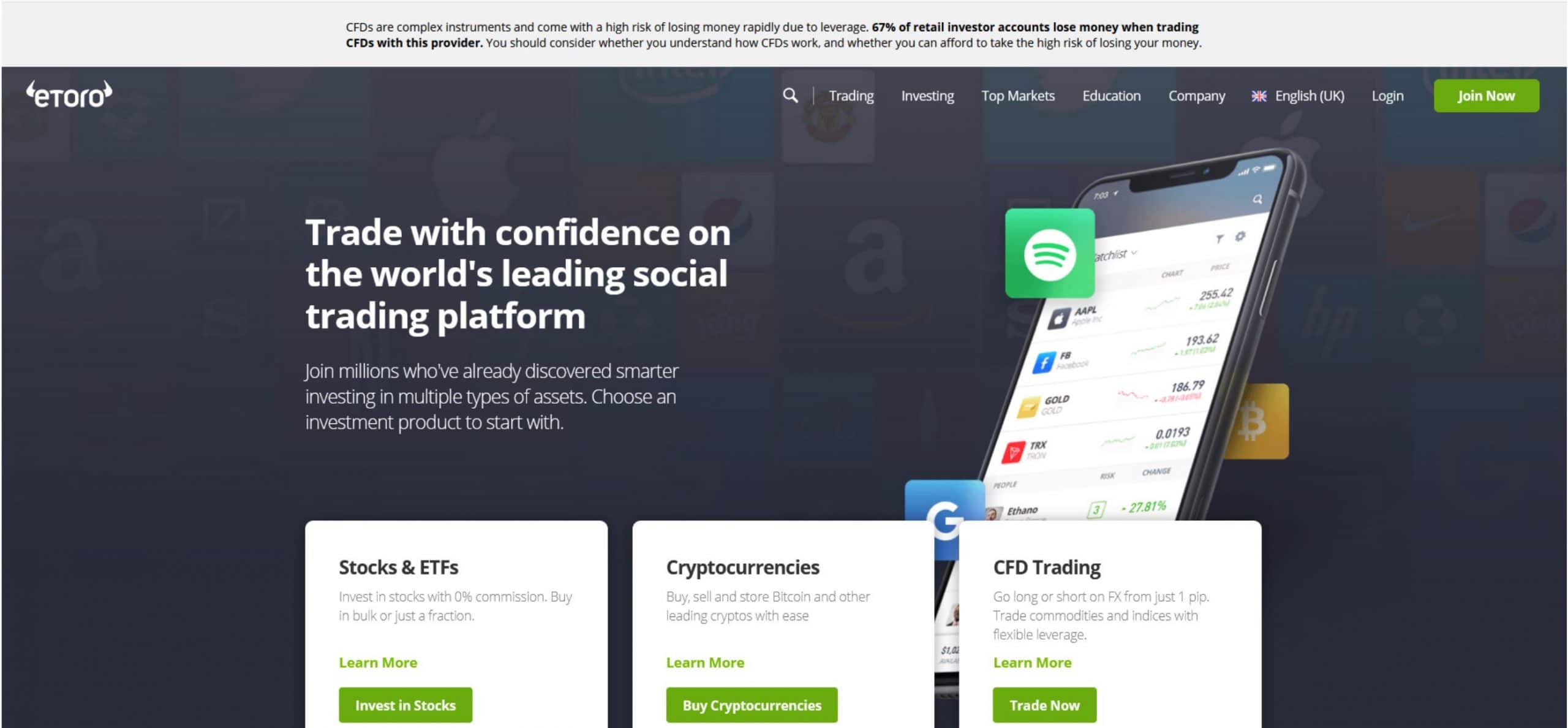
If you are just beginning in the broker business or want to see how it works with a simple broker platform, eToro is the best option for you. It only takes a few minutes to sign up and get started. You can make an account from your computer or phone on the eToro app. Unlike some other brokers, the eToro app is very easy to use and their website is very mobile-friendly.
The minimum deposit is only $200 and can be done with a debit/credit card, a bank account, or through your e-wallet. The main reason it's great for beginners is because of the copy trading feature. If you aren't sure where to start or how to begin trading, you can use the copy trading feature to mirror the trades of a more advanced user.
eToro is licensed by all the important regulatory bodies including FCA, CySEC, and ASIC. The main denomination is USD, making it very easy to use for American-based users.
| Fees | $50 withdrawal fee, $5 fee for cashouts, 0.5% conversion fee |
| Minimum Deposit | $200, $10,000 if you are opening a corporate account |
| Deposit Methods | Debit/credit card, bank transfer, e-wallet |
| Speed of Withdrawal | 3 business days for bank transfers and 4 business days for debit cards |
| Spread Ranges | 1.0-5.0 |
| Leverage Options | Capped at 1:5 |
Pros and Cons of eToro
| Pros | Cons |
| User-friendly and easy to get started | Not enough opportunities to perform tech analysis |
| No commission or share dealing charges | Boring for advanced users |
| More than 800 stocks across international markets | Higher withdrawal fees than other brokers |
| Many ways to deposit funds | |
| Option to copy the trade of others |
2. Avatrade – Low Spread Broker Review

Another very user-friendly platform, Avatrade is one of the more well-known brokers in the business. They offer several trading platforms including on desktop and their app is available for both IOS and Android users. The platform supports MT4 and MT5 if you are interested in using those options.
They offer a free demo account if you want to give them a try before committing. Avatrade is licensed by several regulatory bodies and operates in several countries all over the world. You can be sure that your money and assets are safe on this platform.
Since the minimum deposit is only $100, this is a very accessible platform for new and beginner users. The spread is generally less than 1 pip, much lower than other brokers. You can buy and sell CFD on a commission-free basis in over a thousand different assets.
| Fees | No deposit fee, no withdrawal fee, $50 after 3 months of inactivity |
| Minimum Deposit | $100 |
| Deposit Methods | Bank transfer, credit/debit cards, electronic wallets |
| Speed of Withdrawal | More than 3 days, longer than others |
| Spread Ranges | Less than 1 pip |
| Leverage Options | 1:400 |
Pros and Cons of Avatrade
| Pros | Cons |
| All trades are commission-based | The inactivity fee is very high |
| Fees built into the spread | Not the best option for infrequent users |
| Trade CFDs for stocks and other commodities | |
| More than 200 spread betting markets | |
| Dedicated forex options trading platform |
3. Capital.com– Low Spread Broker Review

Capital.com offers CFDs and Forex on a huge range of assets. They have competitive spreads that are low compared to many other competitive brokers. They have a mobile app for IOS and Android that makes it very user-friendly. Even though they were just founded in 2016, they have more than a million clients in over 50 countries.
They protect investors with leverage of 200:1 depending on the type of account you open. They are fully compliant with the European Security and Markets Authority (ESMA) which means your money is fully protected. They are also regulated by FCA and the CySEC. They have 18 commodities, 29 cryptocurrencies, 68 Forex pairs, various indices, and nearly 1700 individual stocks.
The EUR/USD spread is about 0.6 pips, one of the lowest ones in the market. They don't charge commission on trades and fees are only charged if positions are held overnight.
| Fees | No withdrawal or deposit fees, overnight fees based on leverage, no inactivity fee |
| Minimum Deposit | $20 for card, $200 for bank |
| Deposit Methods | Debit/credit card, electronic wallet, bank transfer |
| Speed of Withdrawal | 5-7 business days |
| Spread Ranges | 0.6-1.3 |
| Leverage Options | 1:30 for major currency pairs, 2:1 for cryptocurrencies, 20:1 for gold and major indices |
Pros and Cons of Capital.com
| Pros | Cons |
| App and desktop websites are easy to use | MT4 isn't available on the app |
| Different leverage options for currencies | Relatively new company |
| Many different assets and markets | |
| Many ways to deposit funds | |
| MT4 options |
4. Fineco – Low Spread Broker Review
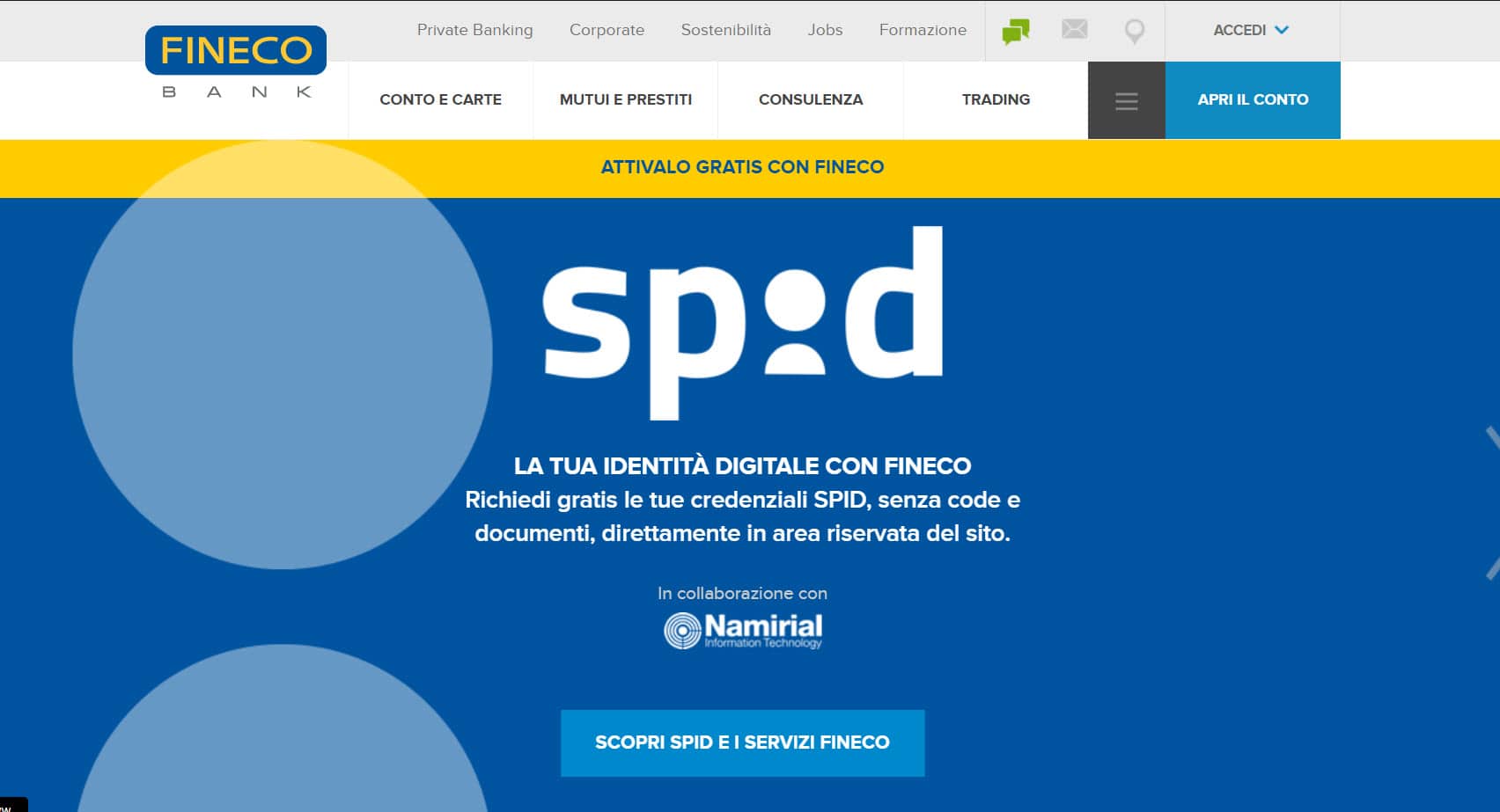
Most new users on Fineco get 100 free trades which makes it a great starting option for beginners or advanced users who could use some free trades. The minimum deposit is small, so you can easily get started without needing to dump in a huge sum of money. Even with the 0.25% annual fee on all stock investments, they are still one of the lowest costing platforms out there.
As well as the USA market, you get access to international markets and automated portfolios. They are regulated by the Financial Conduct Authority (FCA) and FSCS. You can be sure your funds are protected, and you won't have any issues with the deposits and trading you conduct.
Fineco is perfect for serious investors because you can buy and sell shares at just 2.95 GBP per trade. If you plan to trade often or make large trades, this could be a great option as you can do so at a small price. The platform is also very user-friendly, so you don't have to worry about making mistakes or having other issues.
| Fees | 0.25% annual fee on all stock investments, no deposit, withdrawal, or inactivity fees |
| Minimum Deposit | $0 |
| Deposit Methods | Bank wire |
| Speed of Withdrawal | 1 business day |
| Spread Ranges | Within 1 point |
| Leverage Options | 100:1 |
Pros and Cons of Fineco
| Pros | Cons |
| No inactivity or withdrawal fees | 25% annual management fee |
| The platform is easy to use with tracking investment performance tools | Not suitable for beginners |
| 100 free entry trades | Best for serious investors only |
| Portfolio management tools let you track progress | |
| Analysis tools are great for advanced users |
Or visit Fineco bank >
5. Libertex – Low Spread Broker Review
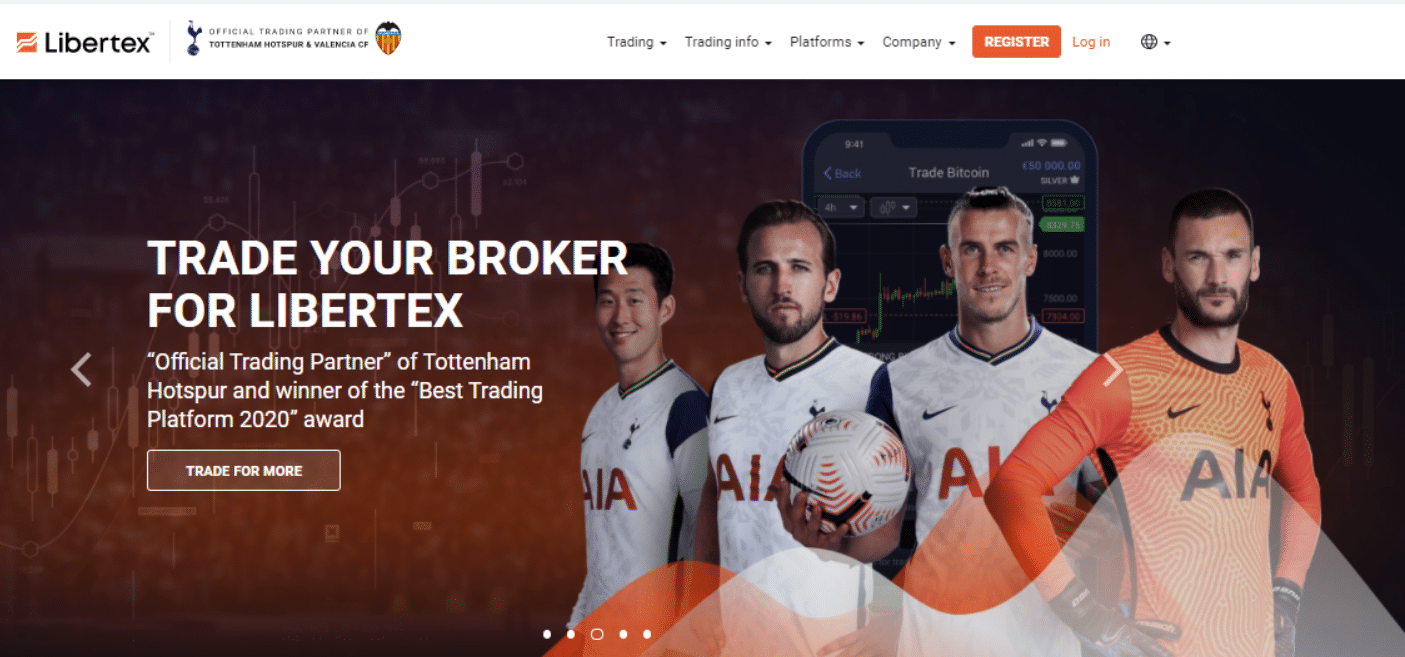
With zero spreads, this is a fantastic option for a low spread broker. Instead of paying the spread, you will pay a small trading commission that will always be charged against the value of your order. With over 2.2 million users worldwide, the platform is quickly growing in popularity.
The best part about the Libertex platform is the way you can customize your screen to meet your personal requirements. This makes the platform great for beginners as well as advanced users who want their screens to appear a certain way online.
One of the other main features is that it offers full support of MT4. You can automate your trades with a robot expert advisor. The platform is much easier to use if you use the MT4 options. They are regulated by the CySEC and a licensing body based in Cyprus.
| Fees | $5 per month on inactive accounts, no withdrawal or deposit fees |
| Minimum Deposit | 100 EUR |
| Deposit Methods | Credit/debit card, bank transfer |
| Speed of Withdrawal | 1 business day |
| Spread Ranges | Zero spreads |
| Leverage Options | 1:30 for retail and 1:600 for professional |
Pros and Cons of Libertex
| Pros | Cons |
| Zero spreads | Only 213 financial instruments |
| Up to 1:30 leverage is higher than average | Not regulated by the FCA |
| More than two decades in the brokerage space | Not the best option if you aren't using MT4 |
| Many ways to deposit funds | |
| Regulated by CySEC |
Low Spread Broker Fees Compared
Most low spread brokers have minimal fees. The biggest thing you need to focus on is the inactivity fees. Many people ignore this when they first make an account because they assume they will be trading for a long time and don't focus on the fees. However, when you decide to stop trading, this inactivity fee can hit you when you least expect it.
Avatrade's inactivity fee of $50 is very steep. It also begins after only 3 months, which is much sooner than the 180-day period that other brokers have. Many low spread brokers do not have inactivity fees or like Libertex, it is only $5 per month, If you don't plan to trade often, try to choose a broker that has no or minimal inactivity fees.
Many low spread brokers also do not have withdrawal or deposit fees which is ideal. This means you can put in as much or money as you want or withdraw funds when you need them without worrying about being overcharged with fees. However, brokers without these fees still have to make their money somehow.
Sometimes the no deposit and withdraw fees are made up somewhere else such as with trading fees or annual management fees. Fineco's 25% annual management fee is considered to be pretty high which is one of the reasons they are more recommended for serious or advanced users.
In general, there are no low spread brokers that don't have fees. There will always be fees of some kind because you are using their platform and they need to make money somehow. Always check all the fees of a platform before you decide to use it.
Oftentimes low spread brokers may also charge an additional fee as commission per trade. Usually, it is a small amount that shouldn't make you stray away from the broker but always double-check the commission rates just in case.
Low Spread Brokers – All You Need to Know
Before getting started with any low spread broker, make sure you have all the information you need to get started in the best way possible.
Most have demo accounts
Almost all low spread brokers have demo accounts. This is a great way to see if you like the platform and the features it uses. It is always a great idea to do a demo account before you deposit any money or begin trading. The demo account usually can only be active for a certain number of hours or days, so make sure you use it after creating it.
There are benefits and risks
With low spread brokers, there are benefits and risks. Obviously, there is a huge reduction in costs when it comes to low spread brokers. This is the main benefit and can be great, especially when you are first starting. They also offer a more direct form of trading because the lower spread means that prices are being quoted closer to the true market price for the currency pair.
With low spread brokers, it is also possible to calculate the potential profits and losses from each trade that you place. They are great for day traders to make money from incremental price movements in currency pairs.
With anything, there will always be some risks involved. Certain currencies will have lower spreads than others due to the amounts that are available and how often they are being traded. USD and GBP have high liquidity and can often be bought and sold for the exact price that you see. Smaller currencies such as NZD have low liquidity and can be hard to access at certain times.
The less liquidity in the currency, the high the spread is. If spreads are very low on currencies that are considered niche, you might need to start wondering how the broker is making money and what happened to make the spread so low.
Focusing exclusively on spreads can also be risky. Try to learn and concentrate on the entire broker and their procedures rather than just the spread.
How to Trade with a Low Spread Broker
First, you need to consider the low spread broker you want to work with. Once you have decided, you can set up an account and begin trading. You also need to choose a forex pair that you want to position on. Always take into account the difference between the buy and sell price. Factor this into your investment before moving forward. For example, let's say you want to trade GBP/USD. Maybe the broker is offering a bid price of 1.0661 and an asking price of 1.0664. The spread here is considered 3 pips.
To make your money on this, you will need to wait until the GBP/USD appreciates by 4 pips. The low pips mean lower barriers to profitability. When you choose to trade currencies that have high spreads, you have to wait longer to trade again and make a profit.
In order to make the most profit, use one of the low spread brokers in this guide. It will help you with trading and ensure you are not losing money.
Zero spread accounts
Some brokers also offer zero spread accounts. This means there is no difference between the bidding and asking price. They might not be exactly zero, but they are consistently averaging very close to zero. The spreads can always widen as the market changes though, so always stay updated with the trades you are making.
The broker may also charge additional commission rates since they aren't making any money from the spread. Trading with a zero spread can make it very easy to enter and exit a trade because you don't need to wait to make a profit. You also don't need to worry about incurring trading costs, as long as the broker isn't charging high commission and trading fees.
The spreads can change even if they are low
While the spreads may be consistently low, they can still be impacted by the economy and world events. If there is a major economic release on the pair or instrument, you can expect the spread to become higher for a brief period of time. Most brokers will widen the spread just a few seconds before the release and allow it to remain wide for about 2 minutes after the release.
Spreads may also widen right around the New York close. The spreads will then begin to normalize an hour into the Tokyo session. Some traders choose to use special scripts or indicators to keep an eye on the platform and the trading values. You should also check the bid and ask the price before you open any position.
Key Factors to Choose the Best Low Spread Broker for You
Before choosing a low spread broker, consider the one that might work the best for you. You can also try demo accounts on various platforms before deciding.
Check that it's regulated in the USA
Since you will be trading within the USA market, you will want to make sure the broker you use is compliant with regulations in this country. They should be a member of the National Futures Association (NFA) and the Commodity Futures Trading Commission (CFTC). Both of these regulate the commodity futures and options markets in the U.S.
Don't just assume by the website that is regulated, always check the About Us section. Make sure there are resources online about the broker and the bodies that stand behind them.
Check the account features
There are many features you should check on to see which broker will work the best for you.
Leverage and margin
Check the size of the leverage and margin and consider if you can work with it. Leverage can help you win positions, but it can also make your losses magnified.
Commissions and spreads
As mentioned early, lower spread brokers might charge higher commission fees. Know exactly how the broker makes their money and shop around with brokers before choosing one. The wider the spread, the more difficult it can be to make a profit. This is why low spread brokers might work better for many traders. Remember that EUR/USD and GBP/USD will always have tighter spreads than currencies that are not traded as often.
Initial Deposit
Most low-spread broker accounts can be started with a small initial deposit. Make sure you have enough money to fund the account before deciding which broker you want to work with.
Step by Step Guide on Starting with a Low Spread Broker – An eToro Guide
Step 1: Open Account
Start by going to the homepage of etoro and clicking "Join Now" or "Trade Now."
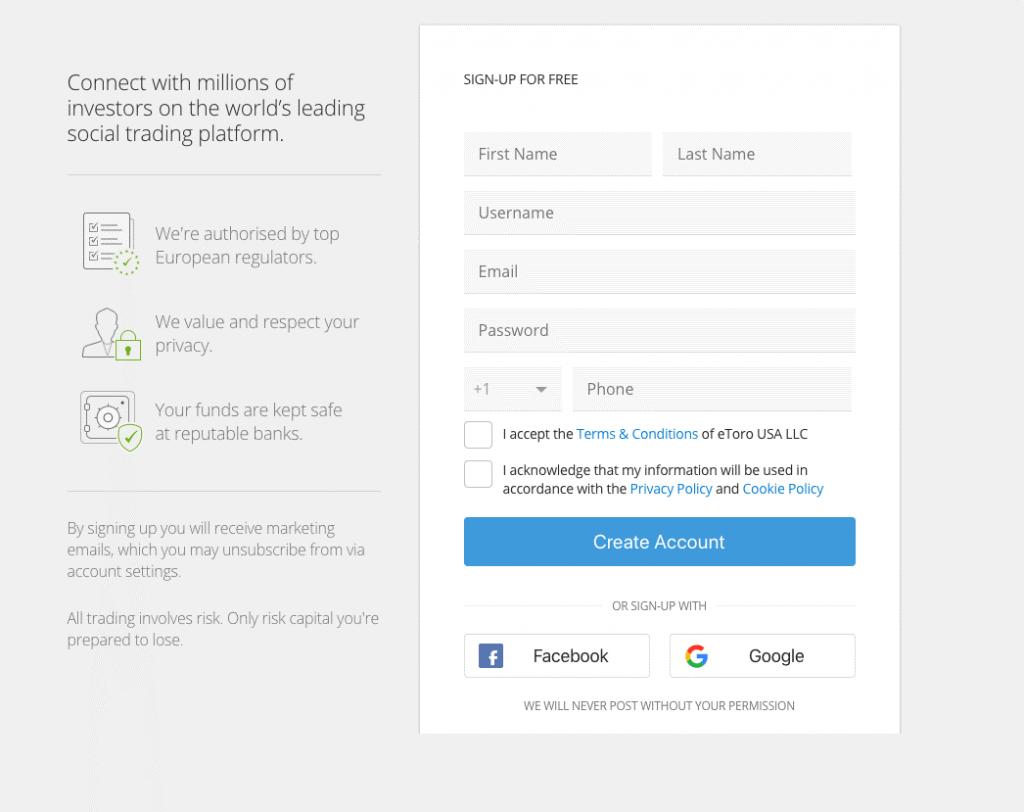
Step 2: Verify your ID
Next, you will need to verify your ID. You can use a passport or ID card. You will need to upload pictures of the front and the back.
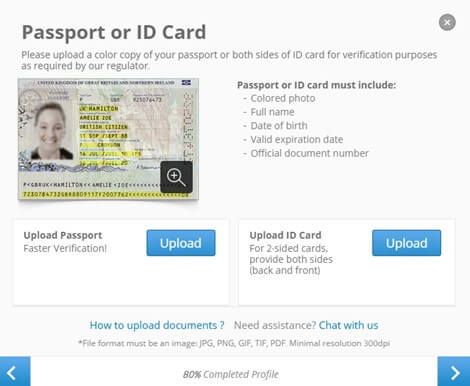
Step 3: Deposit Funds
Next, you will need to fund your account so that you have money to start trading.
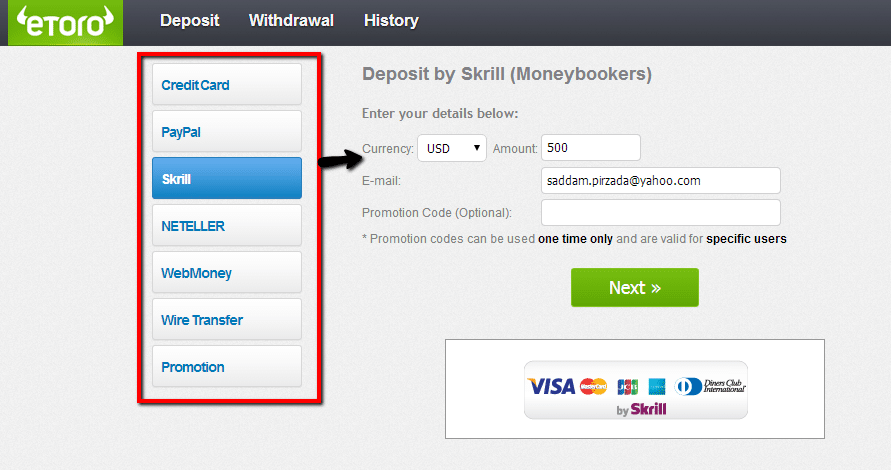
Step 4: Search for different markets
After depositing funds, you can start searching for markets and decide what you want to bid on.
Step 5: Trade
After finding the market you want to work in, begin trading currencies and bidding on prices.
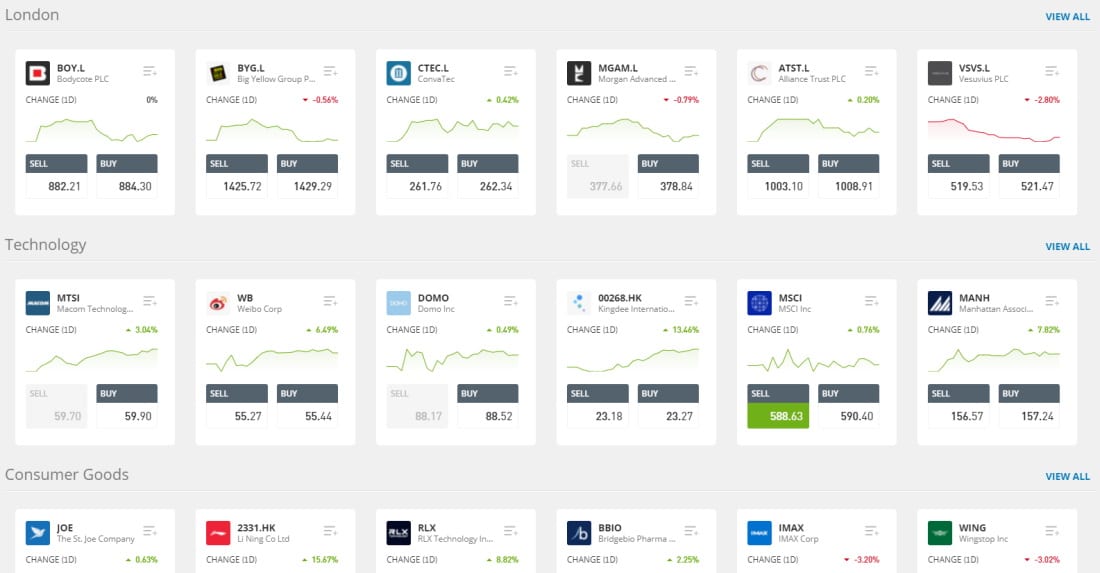
Best Low Spread Brokers – Our Expert Conclusion
The best low spread brokers are the ones listed in this comprehensive guide. Not only do they offer the lowest spreads in the industry, but they also have low commission prices and fees. While some other brokers might have lower spreads, their commission prices and other fees make the low spread not worth it.
eToro is the best low spread broker overall since the minimum deposit is also low and the platform is extremely easy to use. This makes it a fantastic option for beginners. If you are looking for the most commonly used broker with beginners and more advanced users, the best choice is Avatrade. You will be able to experience low spreads and get great experience trading in the market.
Capital.com is a relatively new company which makes it great for advanced users and beginners because you are able to start using it while the spreads and minimum deposit are still very low. The platform is user-friendly and can be used on the desktop or mobile app.
If your main need when it comes to a low spread broker is to have an easy-to-use platform and a mobile-friendly platform, you should choose Fineco bank. Their mobile-friendly app is one of the best in the industry and will keep you connected all the time. You can also easily track your trades and the markets you are watching from your phone or tablet. It's also the best one to use if you travel often because you won't need to bring the computer with you wherever you go.
If experience is your main concern, the best low spread broker for you is Libertex. They are certified by all regulatory bodies and operate in countries all over the world. Your money and trading are definitely safe with them. They also have an easy platform to use giving you the confidence and skills you need to trade efficiently.
Top Low Spread Brokers Platform: eToro
FAQs
Here are the most asked questions about low spread brokers and the things you must know before you make an account and start trading.
Comments
Post a Comment